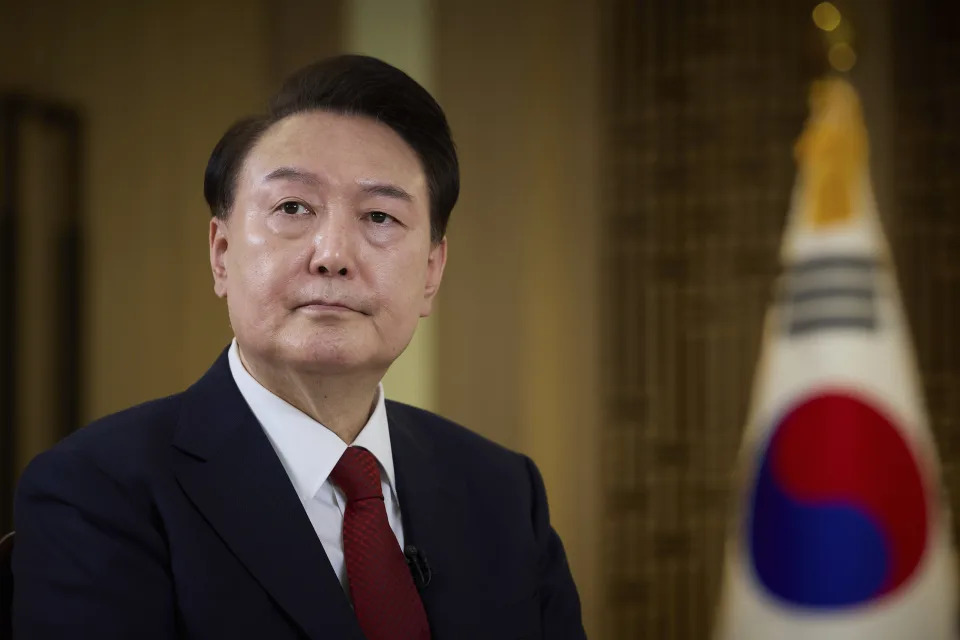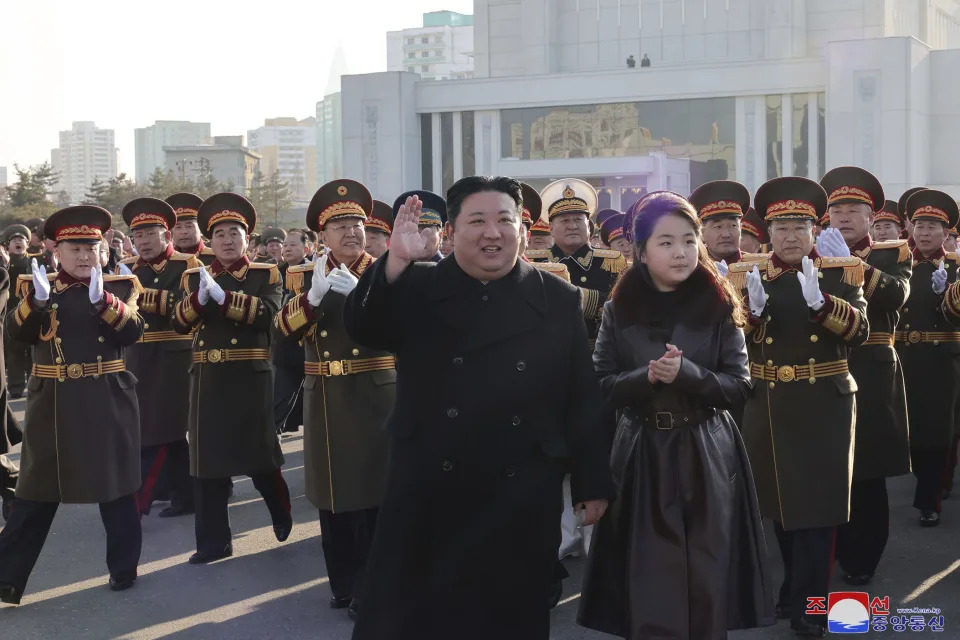South Korean president reiterates that Seoul will not seek its own nuclear deterrent

South Korea's President Yoon Suk Yeol reiterated that the country would not seek its own nuclear deterrent in the face of threats from nuclear-armed North Korea as he vowed further efforts to sharpen nuclear deterrence strategies with ally United States.
South Korea Presidential Office, South Korean President Yoon Suk Yeol speaks during a pre-recorded interview with KBS television at the presidential office in Seoul, South Korea.
In a pre-recorded interview with KBS television that aired Wednesday night, Yoon insisted that South Korea clearly has the technology to quickly acquire nuclear weapons capabilities if it ever decides to do so. But taking that step isn’t a realistic option as it would ruin a trade-dependent economy, he said.
“If we develop nuclear weapons, we will receive various economic sanctions like North Korea does now, and our economy will be dealt a serious blow,” Yoon said, while emphasizing Seoul’s commitment to the nuclear Nonproliferation Treaty.
Yoon, a conservative who took office in 2022, has made similar comments before as he pushed for stronger reassurances from Washington that it would swiftly and decisively use its nuclear capabilities to defend its ally in the event of a North Korean nuclear attack.
Tensions on the Korean Peninsula are at their highest point in years, as North Korean leader Kim Jong Un continues to accelerate his country's weapons tests while issuing p rovocative threats of nuclear conflict with the South.
South Korea has responded by expanding its combined military exercises with the United States and Japan, and the countries have also been upgrading their nuclear deterrence strategies built around strategic U.S. military assets.
In a fiery speech at North Korea’s rubber-stamp parliament last month, Kim declared that the North was abandoning its long-standing objective of reconciliation with the war-divided South and ordered the rewriting of the North Korean constitution to define the South as its most hostile foreign adversary.
Pyongyang's rubber-stamp parliament during a meeting on Wednesday formally abolished laws on economic cooperation with South Korea, according to the North's Korean Central News Agency on Thursday.
Some experts say Kim is seeking to drive up pressure in an election year in South Korea and the United States. There are concerns about a direct provocation in border areas, including the disputed western sea boundary between the Koreas that has been the site of bloody naval skirmishes in past years.
In his interview with KBS, Yoon described Kim’s government as “irrational forces” who are putting further strain on North Korea’s broken economy by aggressively expanding the country's collection of nuclear weapons and missiles.
“We need to keep that in mind as we prepare to counter their security threats or provocations, preparing not just for actions based on rational judgments but also actions based on irrational conclusions,” Yoon said.
South Korean experts and officials say Kim’s aggressive nuclear push despite limited resources has battered an economy already crippled by decades of mismanagement and U.S.-led sanctions over his nuclear ambitions. In a separate report, KCNA said Kim during an inspection on Wednesday of factories producing foodstuff, paper and basic necessities in a rural eastern region berated officials there for unspecified shortcomings in production.
Yoon said the South was willing to provide economic assistance if the North displays genuine willingness to wind down its nuclear weapons and missile program. He said he has no intentions to chase a summit with Kim “if it’s just for show,” saying that previous meetings between Korean leaders did nothing to stop North Korea’s nuclear ambitions.
“The top-down way is not ideal,” Yoon said. “We need a bottom-up structure where there are exchanges and discussions between working-level officials to create agendas and prepare (substantial) results, and summits should come after that."
South Korea: 'Dior bag scandal' a political manoeuvre, president says
South Korea's first lady has been embroiled in what local media call the 'Dior bag scandal'
Spy camera footage of South Korea's first lady accepting a luxury bag gift was leaked as a "political manoeuvre", President Yoon Suk Yeol said.
Mr Yoon said the act was "regrettable" but stopped short of apologising.
He has been under pressure to address the issue, which has roiled his ruling party ahead of key elections in April.
His first comments on what local media has called the "Dior bag scandal" disappointed citizens and angered the opposition.
Late last year, left-wing YouTube channel Voice of Seoul published a video that purportedly showed first lady Kim Keon Hee accepting a 3m won ($2,200; £1,800) Dior bag from a pastor, who filmed the exchange in September 2022 using a camera concealed in his watch.
"The video [was made public] at a time when the general election is drawing near, a year after the issue happened, so we can see this as a political manoeuvre." Mr Yoon told broadcaster KBS.
"The fact that she was unable to cold-heartedly reject him was the problem, if one can call it a problem, and it is a little regrettable," Mr Yoon said.
Some analysts have said the scandal threatens the prospects of Mr Yoon's conservative People Power Party in April's legislative elections. The video was released as his approval ratings were beginning to recover.
The opposition Democratic Party said Mr Yoon fell short of the public's expectations of a sincere apology.
"The president's shameless attitude is hopeless," the party's spokesman Kwon Chil-seung said.
"It's hard to say how long we will continue to watch the self-righteousness of a president who refuses to admit fault and apologise to the people," Mr Kwon said.
Some expressed disappointment on X, formerly Twitter.
"There was no apology for the Dior bag the whole country was waiting for," according to one comment.
Another X user questioned the significance of Mr Yoon's apology at this time: "Even if you receive an apology from such a shameless and unwilling authority, what is the meaning of that apology, which you were forced to accept like squeezing apple juice for several months?"
Several conservative newspapers, such as Joongang Ilbo and Chosun Ilbo, pointed out that Mr Yoon did not comment on the appropriateness of Ms Kim's actions.
Local publications have reported that the presidential office confirmed receipt of the bag and said that it was "being managed and stored as a property of the government".
A Gallup Korea poll last week showed that Mr Yoon's approval ratings had fallen to 29%, the lowest in nine months. The scandal involving the 51-year-old first lady was among the reasons respondents cited for their disapproval.
The scandal has also caused rifts within Mr Yoon's party. One party leader compared the first lady with Marie Antoinette, the French queen who is notorious for her extravagant ways.
The Dior bag scandal is the latest in a string of controversies surrounding Ms Kim. The opposition has long accused her of being involved in stock price manipulation. Earlier this month, Mr Yoon vetoed a bill calling for his wife to be investigated over these allegations.
Last year, Seoul's government scrapped an expressway project following allegations that its construction would financially benefit Ms Kim's family by raising the prices of land that they own.
North Korea's Kim says he has no desire for talks and repeats a threat to destroy South if provoked
North Korean leader Kim Jong Un restated he has no desire for diplomacy with South Korea and that the North would annihilate its rival if provoked, state media said Friday, in the latest of his belligerent statements that are raising tensions in the region.
During a visit to North Korea’s Defense Ministry on Thursday, Kim said his recent moves to cut ties with South Korea allow his military to take on a more aggressive posture “by securing lawfulness to strike and destroy (the South) whenever triggered."
Tensions on the Korean Peninsula have increased in recent months, with Kim elevating his weapons demonstrations and threats and the United States, South Korea and Japan strengthening their combined military exercises in response.
While most South Korean officials and experts have downplayed the possibility that Kim has real intent to engage in a war, concerns about a direct military provocation have grown as the North may try to ramp up pressure in an election year in South Korea and the United States.
The North’s official Korean Central News Agency reported Kim said he took the initiative to “shake off the unrealistic pretense of dialogue and cooperation with the (South) Korean puppets who sought the collapse of our republic.” The agency said Kim on his visit to the ministry was accompanied by his daughter, thought to be named Kim Ju Ae, who some experts believe is being groomed as a future leader.
Kim Jong Un’s remarks came weeks after he declared to his rubber-stamp parliament that North Korea was abandoning its long-standing objective of a peaceful unification with South Korea and ordered the rewriting of its constitution to cement the South as its most hostile foreign adversary.
The North has since shut down government departments that handled affairs with the South, tore down a major unification monument and abolished laws that had governed past economic projects with the South.
Experts say Kim’s attempts to recalibrate relations with the South, which come amid a testing spree of potentially nuclear-capable weapons targeting neighboring rivals and the United States, are aimed at reducing Seoul’s voice and eventually forcing direct negotiations with Washington over the nuclear standoff. His long-term goal is to force the United States to accept the idea of the North as a nuclear power and negotiate security and economic concessions from a position of strength.
Other analysts say Kim may want to raise tensions with South Korea to maintain a sense of external threat for his domestic audience. Kim’s government has recently been strengthening campaigns to remove the influence of South Korean pop culture and language amongst his population, which he may see as beneficial to reinforcing the North’s national identity and prolonging his family’s dynastic rule.
In a pre-recorded interview with local television that aired Monday, South Korean President Yoon Suk Yeol described Kim’s government as “irrational” actors who are putting further strain on North Korea’s broken economy by aggressively expanding the country’s collection of nuclear weapons and missiles.
“We need to keep that in mind as we prepare to counter their security threats or provocations, preparing not just for actions based on rational judgments but also actions based on irrational conclusions,” Yoon said.
- Questions and Answers
- Opinion
- Story/Motivational/Inspiring
- Technology
- Art
- Causes
- Crafts
- Dance
- Drinks
- Film/Movie
- Fitness
- Food
- Игры
- Gardening
- Health
- Главная
- Literature
- Music
- Networking
- Другое
- Party
- Religion
- Shopping
- Sports
- Theater
- Wellness
- News
- Culture
- War machines and policy




